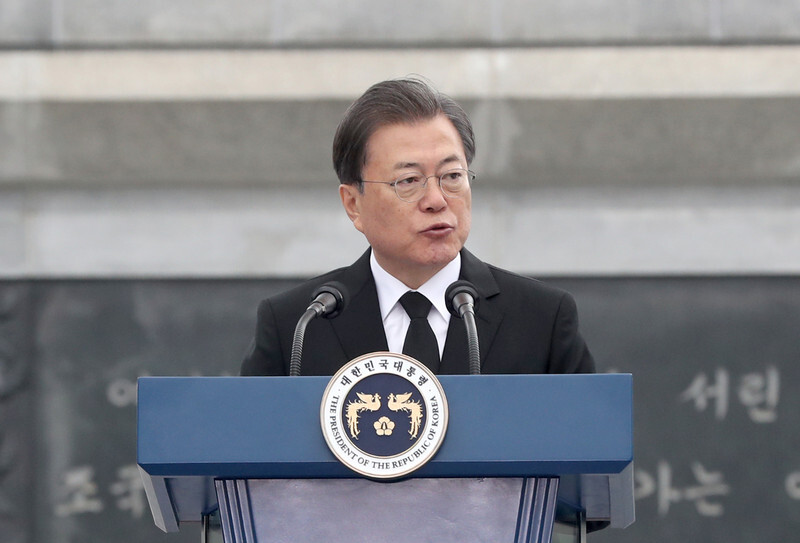hankyoreh
Links to other country sites 다른 나라 사이트 링크
Moon’s approval rating rises above 50% for first time since November 2018

South Korean President Moon Jae-in’s governance approval rating rose by six percentage points from last week to 55% amid positive assessments of his administration’s response to the novel coronavirus outbreak, survey findings show.
Gallup Korea asked 1,001 South Korean adults nationwide to assess Moon’s job performance in a poll conducted on Mar. 24-26 (95% confidence level, ±3.1 percentage point margin of error). The results showed an approval rating of 55%, up six percentage points from 49% last week, the polling organization said. Negative ratings were down by three percentage points to 39%, compared to 42% last week. It marked the first time in the 16 months since November 2018 that Moon recorded a governance approval rating over 50% and disapproval rating below 40%.
The most frequently cited reason for a positive rating was his “handling of the coronavirus situation” (56%), following him “doing his best and working hard” (6%) and “generally handling things well” (4%). The coronavirus response was the top reason for a positive rating for eighth straight weeks, with the percentage of responses citing it rising during the past month. The most commonly cited reason for a negative rating was an “inadequate response to the coronavirus situation” (24%), followed by a “lack of economic and livelihood problem solving” (24%) and “generally lacking [governance]” (12%).
Among political parties, the Democratic Party and United Future Party received respective support levels of 37% and 22%, each down by one percentage point from the week before. Other support levels included 5% for the Justice Party, 4% for the People’s Party, 2% for the Open Democrats, and 1% for the Our Republican Party. Twenty-seven percent of residents did not support any party.
When asked which proportional party they would be voting for in the general election on Apr. 15, 25% named the Democratic Party, while 24% named the United Future Party, 9% each the Open Democrats and Justice Party, 6% the People’s Party, and 1% the Our Republican Party. Twenty-four percent of respondents, or roughly one in four, were “swing voters” who did not indicate which party they planned to vote for.
“There still seem to be a lot of voters who are reserving judgment after the adoption of the new election system and watching the realignment of the parties around proportional representation,” Gallup Korea said.
In terms of party support ratings over the same period, the Together Citizens’ Party, a proportional representation coalition party spearheaded by the Democratic Party for the general election, recorded a 37% rating, which was 12 percentage points lower than the Democratic Party’s rating. This was the result of Democratic Party supporters splitting between the Open Democrats (15%) and Justice Party (10%) in their proportional party selections rather than uniting behind the Together Citizens’ Party (59%). While the Open Democrats have former Blue House figures such as Kim Eui-kyum and Choi Kang-wook leading their proportional representation tickets, the Together Citizens’ Party assigned lower numbers to proportional representation candidates from the Democratic Party.
Meanwhile, the Future Korea Party was supported by 24% of respondents, or two percentage points more than the United Future Party (22%). The Justice Party, People’s Party, and Open Democrats received respective proportional representation party support levels of 9%, 6%, and 9%, which were four, six, and seven percentage points higher than their respective party support ratings.
By Yi Ju-been, staff reporter
Please direct comments or questions to [english@hani.co.kr]

Editorial・opinion
![[Column] Has Korea, too, crossed the Rubicon on China? [Column] Has Korea, too, crossed the Rubicon on China?](https://flexible.img.hani.co.kr/flexible/normal/500/300/imgdb/original/2024/0419/9317135153409185.jpg) [Column] Has Korea, too, crossed the Rubicon on China?
[Column] Has Korea, too, crossed the Rubicon on China?![[Correspondent’s column] In Japan’s alliance with US, echoes of its past alliances with UK [Correspondent’s column] In Japan’s alliance with US, echoes of its past alliances with UK](https://flexible.img.hani.co.kr/flexible/normal/500/300/imgdb/original/2024/0419/2317135166563519.jpg) [Correspondent’s column] In Japan’s alliance with US, echoes of its past alliances with UK
[Correspondent’s column] In Japan’s alliance with US, echoes of its past alliances with UK- [Editorial] Does Yoon think the Korean public is wrong?
- [Editorial] As it bolsters its alliance with US, Japan must be accountable for past
- [Guest essay] Amending the Constitution is Yoon’s key to leaving office in public’s good graces
- [Editorial] 10 years on, lessons of Sewol tragedy must never be forgotten
- [Column] A death blow to Korea’s prosecutor politics
- [Correspondent’s column] The US and the end of Japanese pacifism
- [Guest essay] How Korea turned its trainee doctors into monsters
- [Guest essay] As someone who helped forge Seoul-Moscow ties, their status today troubles me
Most viewed articles
- 1[Column] The clock is ticking for Korea’s first lady
- 2[Correspondent’s column] In Japan’s alliance with US, echoes of its past alliances with UK
- 3Samsung barricades office as unionized workers strike for better conditions
- 4After 2 months of delayed, denied medical care, Koreans worry worst may be yet to come
- 5[Column] Has Korea, too, crossed the Rubicon on China?
- 6[Editorial] When the choice is kids or career, Korea will never overcome birth rate woes
- 7Hong Se-hwa, voice for tolerance whose memoir of exile touched a chord, dies at 76
- 8US overtakes China as Korea’s top export market, prompting trade sanction jitters
- 9Constitutional Court rules to disband left-wing Unified Progressive Party
- 10Nearly 1 in 5 N. Korean defectors say they regret coming to S. Korea